
A British comic is a periodical published in the United Kingdom that contains comic strips. It is generally referred to as a comic or a comic magazine, and historically as a comic paper. As of 2014, the three longest-running comics of all time were all British.

Tiger was a weekly British comics periodical published by Amalgamated Press, Fleetway Publications and IPC Magazines from 11 September 1954 to 30 March 1985. The title was initially launched in a large tabloid size to mimic newspapers; while it featured some action-adventure stories Tiger contained a large number of sport strips. The most famous of these was "Roy of the Rovers", which debuted in the first issue and was the comic's most popular feature, eventually transferring to its own comic in 1975. Tiger would go on to become one of the company's longest-running titles, with 1,573 issues published before being merged with Eagle in 1985. Over the course of its run, Tiger featured columns by numerous famous sports figures, including Ian Botham, Geoff Boycott, Tony Greig, Trevor Francis and Charlie Nicholas.
The Amalgamated Press (AP) was a British newspaper and magazine publishing company founded by journalist and entrepreneur Alfred Harmsworth (1865–1922) in 1901, gathering his many publishing ventures together under one banner. At one point the largest publishing company in the world, AP employed writers such as Arthur Mee, John Alexander Hammerton, Edwy Searles Brooks, and Charles Hamilton. Its subsidiary, the Educational Book Company, published The Harmsworth Self-Educator, The Children's Encyclopædia, and Harmsworth's Universal Encyclopaedia. The company's newspapers included the Daily Mail, the Daily Mirror, The Evening News, The Observer, and The Times. At its height, AP published over 70 magazines and operated three large printing works and paper mills in South London.
Angus Peter Allan was a British comic strip writer and magazine editor who worked on TV Century 21 in the 1960s and Look-in magazine during the 1970s. Most commonly known as Angus Allan and sometimes credited as Angus P. Allan, he was responsible for original comic strip adaptations of numerous popular TV series.

Lion was a weekly British comics periodical published by Amalgamated Press from 23 February 1952 to 18 May 1974. A boys' adventure comic, Lion was originally designed to compete with Eagle, the popular weekly comic published by Hulton Press that had introduced Dan Dare. It debuted numerous memorable characters, including Captain Condor, Robot Archie, Paddy Payne and the Spider. Lion lasted for 1,156 issues before being merged with stablemate Valiant.
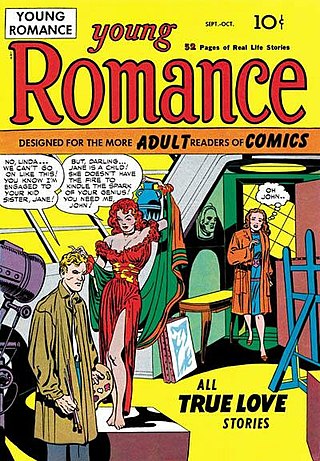
Romance comics are a genre of comic books that were most popular during the Golden Age of Comics. The market for comics, which had been growing rapidly throughout the 1940s, began to plummet after the end of World War II when military contracts to provide disposable reading matter to servicemen ended. This left many comic creators seeking new markets. In 1947, part of an effort to tap into new adult audiences, the romance comic genre was created by Joe Simon and Jack Kirby with the Crestwood Publications title Young Romance.
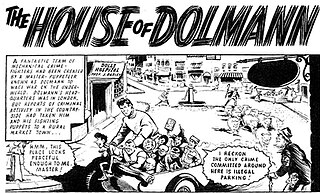
"The House of Dolmann" is a British comic strip published by Fleetway Publications and later IPC Magazines in the boys' comic anthology title Valiant between 29 October 1966 to 11 April 1970, with a brief revival from 7 September to 26 October 1974. Written by Tom Tully and primarily illustrated by Eric Bradbury, the strip centred on the exploits of genius inventor Eric Dolmann and his army of crime-fighting robot 'puppets'.

Odhams Press was a British publishing company, operating from 1920 to 1968. Originally a magazine publisher, Odhams later expanded into book publishing and then children's comics. The company was acquired by Fleetway Publications in 1961 and then IPC Magazines in 1963. In its final incarnation, Odhams was known for its Power Comics line of titles, notable for publishing reprints of American Marvel Comics superheroes.

Princess Tina was a British weekly girls' comic anthology published by Fleetway Publications and IPC Magazines from 23 September 1967 to 12 January 1974. The comic was created by combining two underperforming Fleetway titles — Princess and Tina — into a third, new comic. Notable strips included the long-running family drama "The Happy Days" and "Patty's World". The latter would outlive Princess Tina, continuing after the comic was merged into Pink.
British girls' comics flourished in the United Kingdom from the 1950s through the 1970s, before beginning to decline in popularity in the 1980s and 1990s. Publishers known for their girls' comics included DC Thomson and Fleetway/IPC. Most titles appeared weekly, with the content primarily in picture-story format. The majority of the stories were serialized, with two or three pages per issue, over eight to twelve issues. They were marketed toward young teen girls.
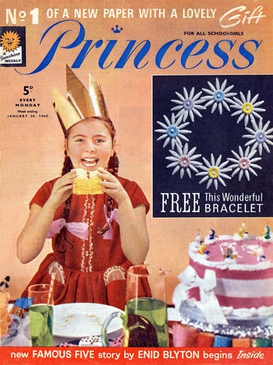
Princess was a British weekly girls' comic anthology published by Fleetway Publications and, later, IPC Magazines. The first version was published between 30 January 1960 and 16 September 1967, and featured a mix of comic strips, text stories and a large proportion of features; it was merged with Tina to form a new title - Princess Tina - after 399 issues.

June was a British weekly girls' comic anthology published by Fleetway Publications and IPC Magazines from 18 March 1961 to 15 June 1974. Designed as a response to DC Thomson's hit Bunty, June never quite eclipsed its Scottish rival but was nevertheless a success on its own terms, reaching 631 issues before being merged into Tammy in 1974.
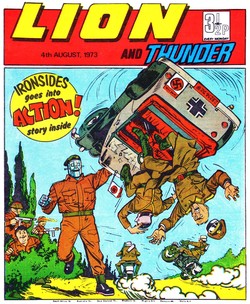
The Steel Commando is a British comic character, appearing in strips published by IPC Magazines. Created by Frank S. Pepper, the character first appeared in the first issue of the short-lived boys' weekly adventure anthology comic Thunder, dated 17 October 1970. After Thunder ended in March 1971 the strip continued in Lion until 1974. The character is a robotic soldier fighting for the British Army in World War II; due to a programming error the mechanical man will only obey the orders of layabout Private Ernest 'Excused Boots' Bates.

Cursitor Doom is a fictional British comic book character who debuted in a self-titled comic strip in the 15 March 1969 issue of the anthology Smash!, published by IPC Magazines. Created by Ken Mennell, Cursitor Doom is a powerful mystic who protects Earth from supernatural threats.

"The Indestructible Man" is a British comic strip published by Fleetway Publications and later IPC Magazines in the boys' comic anthology title Jag between 4 May 1968 to 29 March 1969. Written by Scott Goodall and drawn by Jesús Blasco, the story followed an Ancient Egyptian warrior who survived into the present day after learning a number of skills while entombed, and took on the identity of crime-fighter Mark Dangerfield.
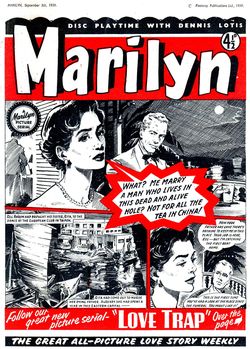
Marilyn was a British girls romance comic published weekly by Amalgamated Press and Fleetway Publications between 19 March 1955 and 18 November 1965. It ran for between 547 and 549 issues before merging with Valentine.

Roxy was a British girls romance comic published weekly by Amalgamated Press and Fleetway Publications between 15 March 1958 and 14 September 1963. It ran for 288 issues before merging with Valentine.

Eagle, sometimes referred to as The New Eagle and known at various points in its life as Eagle and Scream!, Eagle and Tiger, Eagle and Battle, Eagle and M.A.S.K. and Eagle and Wildcat, was a British boys' adventure comic published by IPC Magazines from 27 March 1982 to January 1994. A revival of the famous Eagle, the title was initially a weekly publication until turning into a monthly in May 1991. The title was finally cancelled in January 1994, after 505 issues.
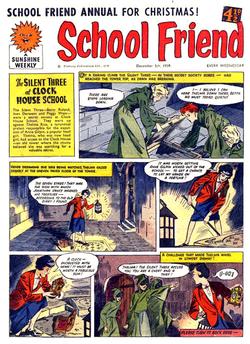
School Friend was a British weekly girls' comic anthology published by Amalgamated Press and Fleetway Publications from 20 May 1950 to 23 January 1965. Considered the first British girls' comic and bearing the same name as a popular story paper previously published by Amalgamated Press, School Friend was a huge success and effectively kickstarted the genre in British publishing.
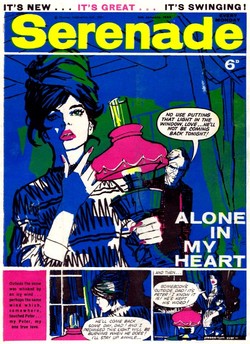
Serenade was a British weekly anthology romance comic published by Fleetway Publications from 22 September 1962 to 9 February 1963. Intended as a companion title to the company's successful Valentine with lavish production values, the comic failed to find an audience and was cancelled after 21 issues.

















